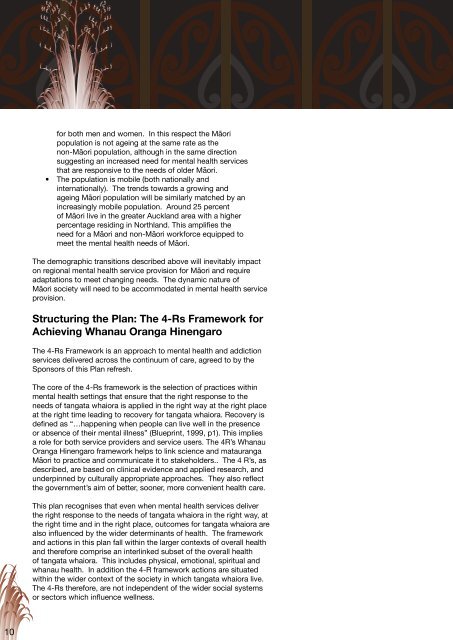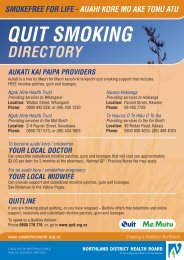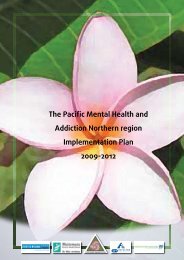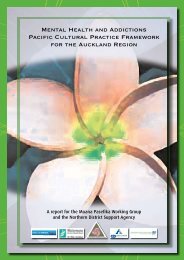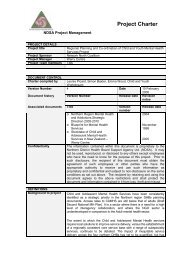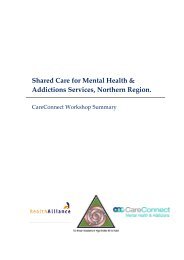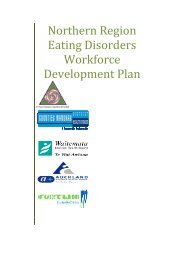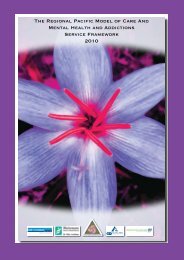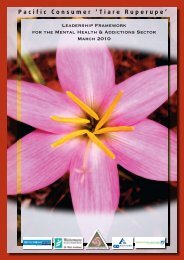Whanau Oranga Hinengaro: Northern Region Maori ... - Network North
Whanau Oranga Hinengaro: Northern Region Maori ... - Network North
Whanau Oranga Hinengaro: Northern Region Maori ... - Network North
You also want an ePaper? Increase the reach of your titles
YUMPU automatically turns print PDFs into web optimized ePapers that Google loves.
for both men and women. In this respect the Māori<br />
population is not ageing at the same rate as the<br />
non-Māori population, although in the same direction<br />
suggesting an increased need for mental health services<br />
that are responsive to the needs of older Māori.<br />
• The population is mobile (both nationally and<br />
internationally). The trends towards a growing and<br />
ageing Māori population will be similarly matched by an<br />
increasingly mobile population. Around 25 percent<br />
of Māori live in the greater Auckland area with a higher<br />
percentage residing in <strong>North</strong>land. This amplifies the<br />
need for a Māori and non-Māori workforce equipped to<br />
meet the mental health needs of Māori.<br />
The demographic transitions described above will inevitably impact<br />
on regional mental health service provision for Māori and require<br />
adaptations to meet changing needs. The dynamic nature of<br />
Māori society will need to be accommodated in mental health service<br />
provision.<br />
Structuring the Plan: The 4-Rs Framework for<br />
Achieving <strong>Whanau</strong> <strong>Oranga</strong> <strong>Hinengaro</strong><br />
The 4-Rs Framework is an approach to mental health and addiction<br />
services delivered across the continuum of care, agreed to by the<br />
Sponsors of this Plan refresh.<br />
The core of the 4-Rs framework is the selection of practices within<br />
mental health settings that ensure that the right response to the<br />
needs of tangata whaiora is applied in the right way at the right place<br />
at the right time leading to recovery for tangata whaiora. Recovery is<br />
defined as “…happening when people can live well in the presence<br />
or absence of their mental illness” (Blueprint, 1999, p1). This implies<br />
a role for both service providers and service users. The 4R’s <strong>Whanau</strong><br />
<strong>Oranga</strong> <strong>Hinengaro</strong> framework helps to link science and matauranga<br />
Māori to practice and communicate it to stakeholders.. The 4 R’s, as<br />
described, are based on clinical evidence and applied research, and<br />
underpinned by culturally appropriate approaches. They also reflect<br />
the government’s aim of better, sooner, more convenient health care.<br />
This plan recognises that even when mental health services deliver<br />
the right response to the needs of tangata whaiora in the right way, at<br />
the right time and in the right place, outcomes for tangata whaiora are<br />
also influenced by the wider determinants of health. The framework<br />
and actions in this plan fall within the larger contexts of overall health<br />
and therefore comprise an interlinked subset of the overall health<br />
of tangata whaiora. This includes physical, emotional, spiritual and<br />
whanau health. In addition the 4-R framework actions are situated<br />
within the wider context of the society in which tangata whaiora live.<br />
The 4-Rs therefore, are not independent of the wider social systems<br />
or sectors which influence wellness.<br />
10


